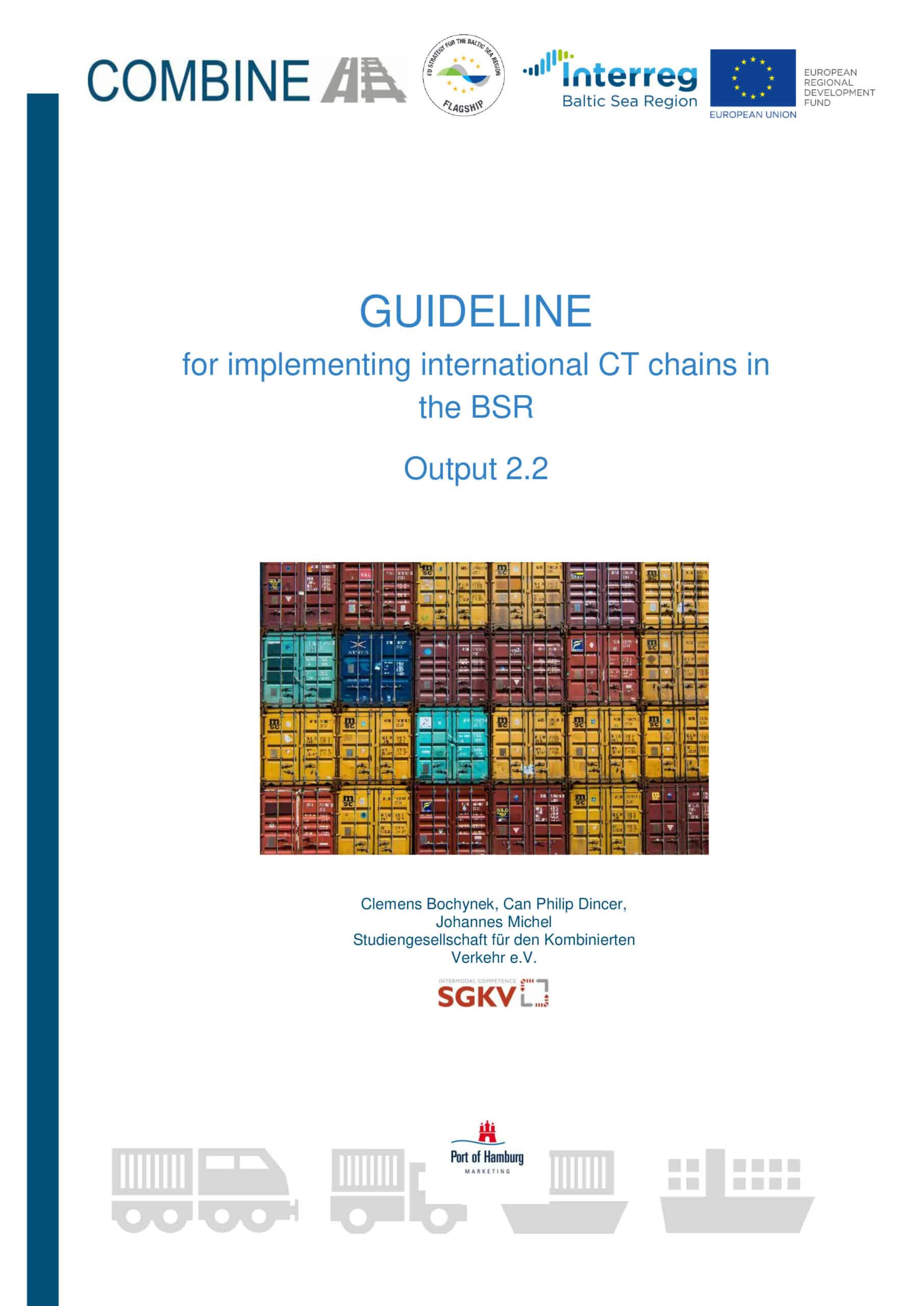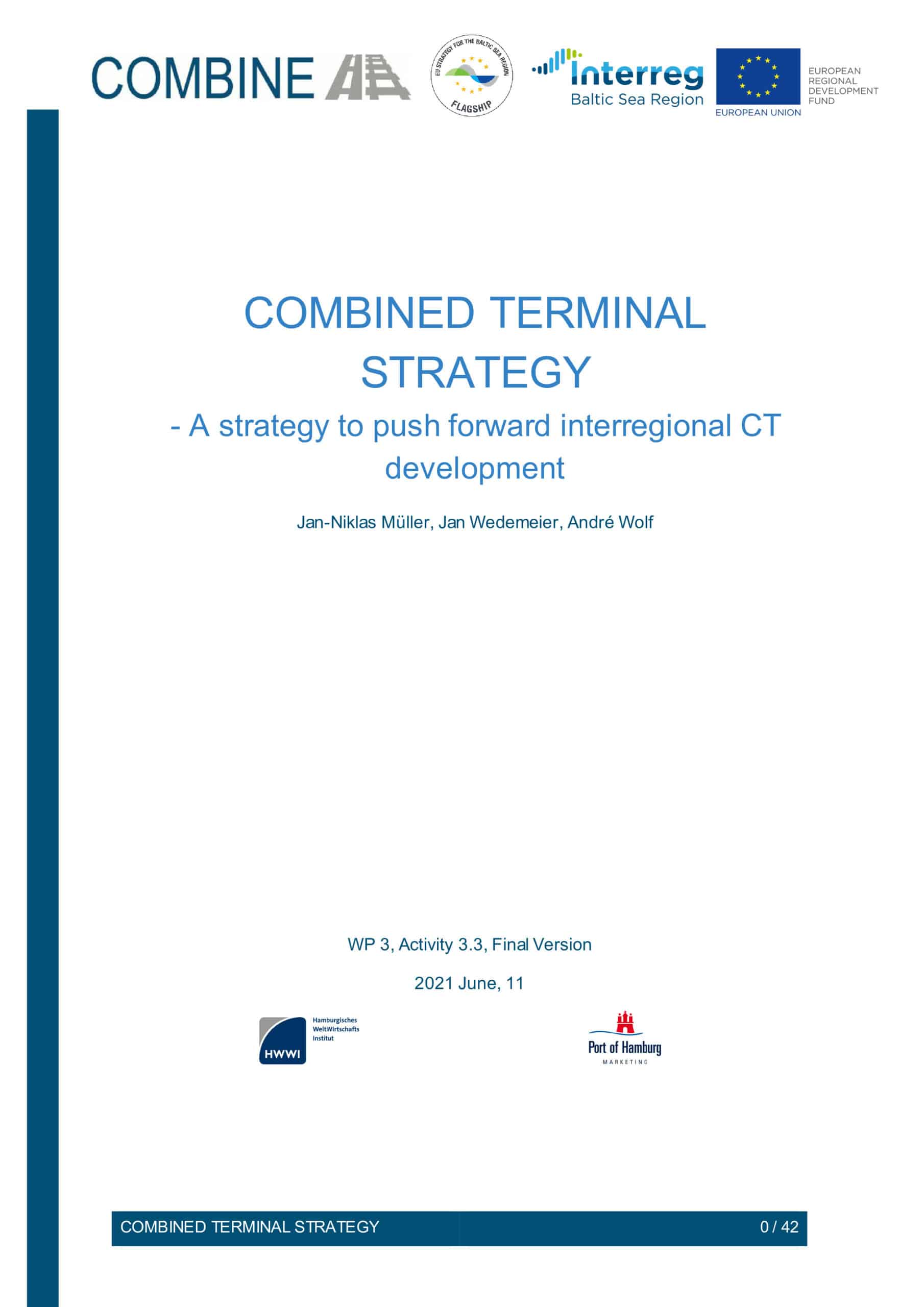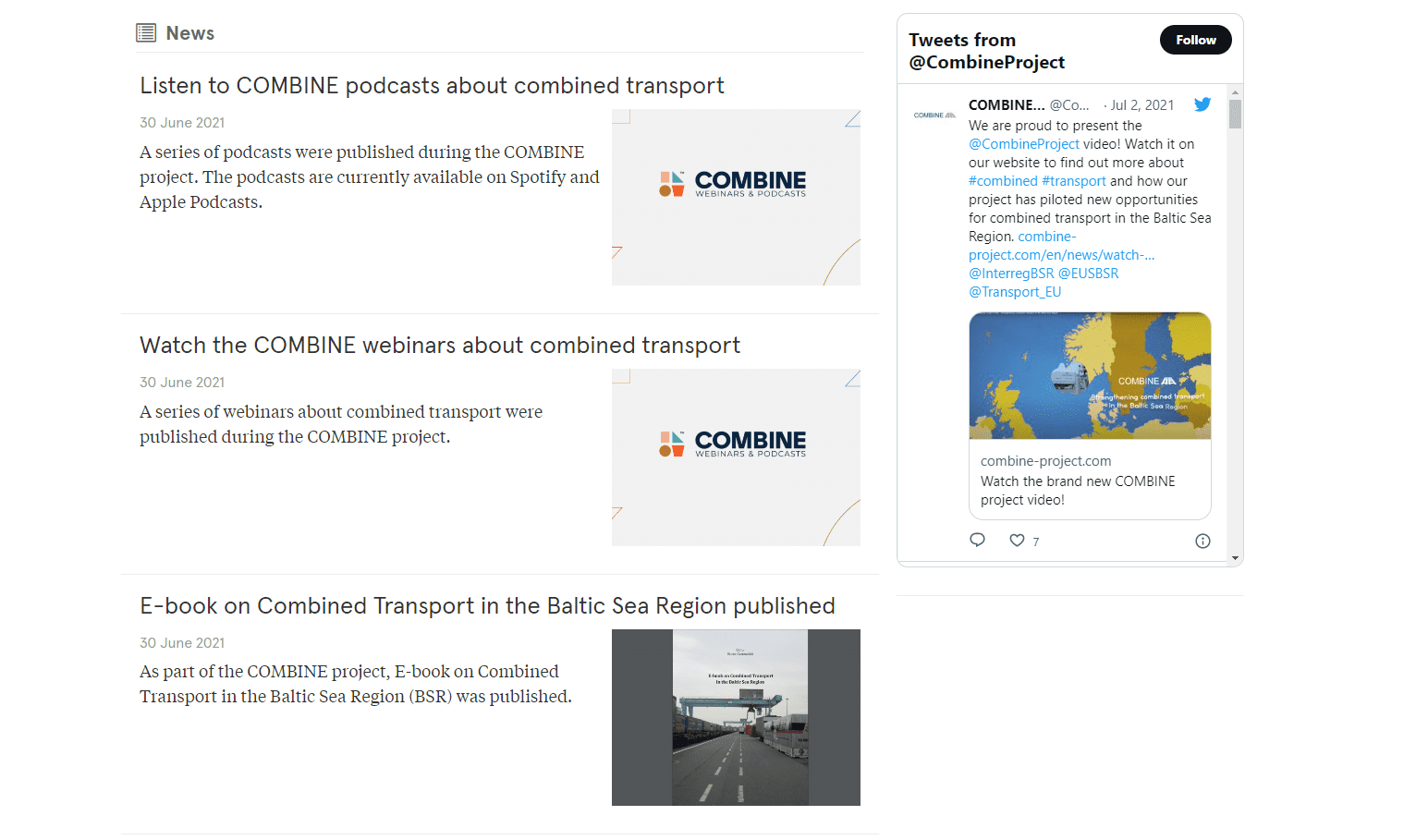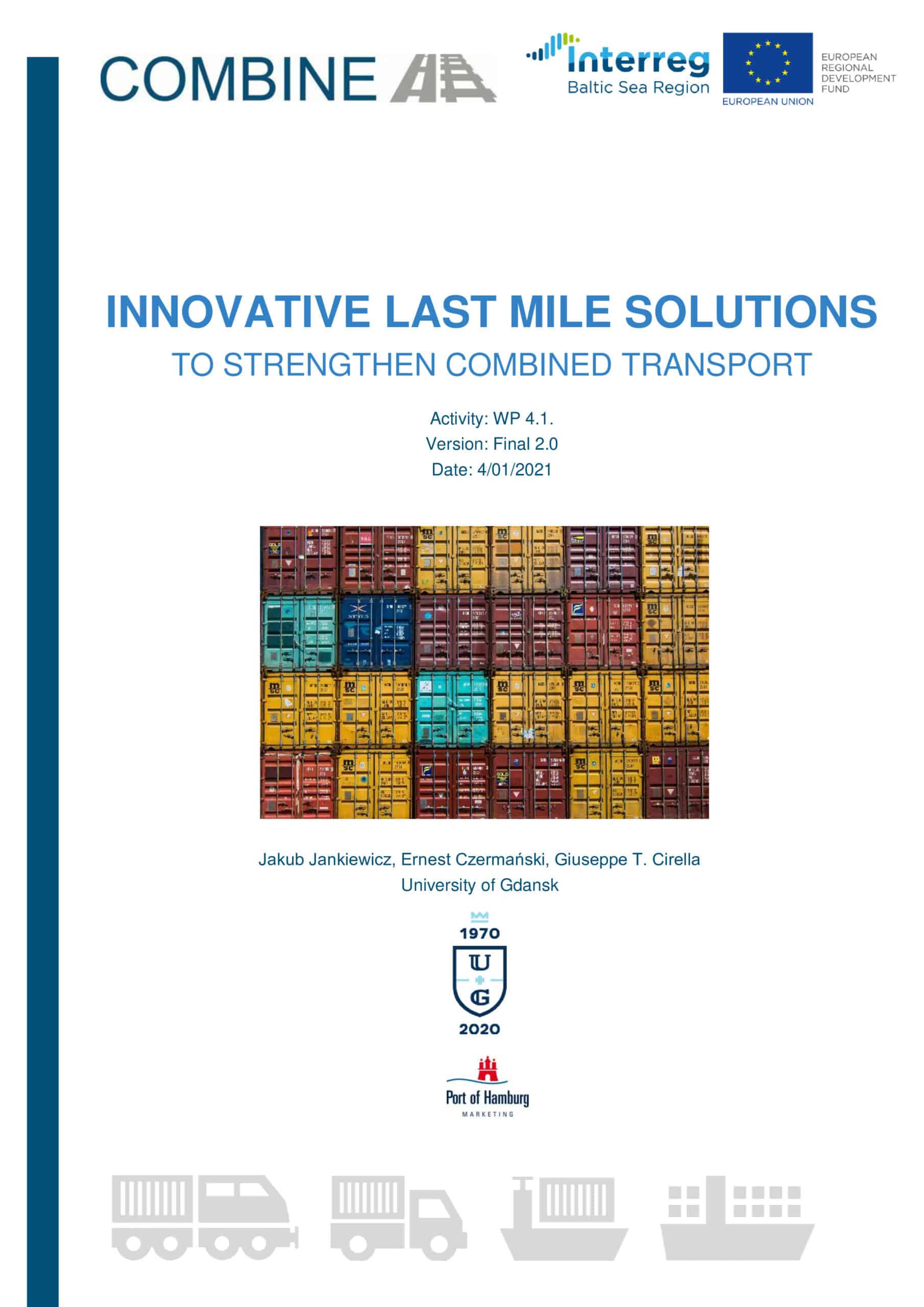COMBINE
Combining different transport modes results in additional handling efforts which cost time and money. In order to make it efficient, handling costs should be compensated by lower transport cost of the main leg and last mile of the transport chain. The longer the main leg and the shorter last mile, the more competitive combined transport is, in general. In the Baltic Sea combined transport to date can hardly compete with road transport due to rural structures, comparatively low transport volumes and a long tradition of pure road transport. Thus, the share of combined transport is low. This results in inexperience and insufficient knowledge about combined transport and thus low exploitation of the potential of combined transport. COMBINE made the effort to overcome these challenges.
New technologies and better organization
COMBINE project helped to increase the share of combined transport, where goods are moved by train, ships or barges, with the first and last mile covered by road as short as possible. The project allowed to improve the operation at the terminals and reduce the costs of the last mile by introducing new solutions such as platooning, longer/heavier trucks, e-trucks, and LNG-trucks.
Budgets
in numbers
-
3.39MillionTotal
-
2.64MillionErdf
-
0.00MillionEni + Russia
-
0.00MillionNorway
Achievements
Mapping the combined transport market
COMBINE has strengthened combined transport (CT) in the Baltic Sea region by introducing innovative transport solutions and improving the data basis needed for setting up new services. In addition, it has promoted the needs of the region on a European level and brought relevant stakeholders together. A major benefit has been the transnational exchange and learning process.
The COMBINE partners have prepared a detailed overview of the CT market in the Baltic Sea region. . This includes the terminal landscape (with a focus on combined transport), the legal framework and organisational structure as well as the most promising trade lanes to further develop CT in the region.
Tailor-made pilots and solutions
Interesting pilots have successfully tested innovative CT solutions. In Sweden, transport in the Gothenburg hinterland, today transported by road, has been shifted to rail as a test case. To make the intermodal transport chain efficient, the last mile from the rail terminal to the warehouse has been carried out by High Capacity Trucks (Two 40 feet containers). Another pilot focuses on East-West rail transports involving the Baltic States and Russia as well as Poland and Germany. Recommendations from these pilots can serve as the blueprint for future services.
Bringing the discussions to the European level
COMBINE started a series of consultation meetings with National Ministries to discuss how to strengthen combined transport and how to consider the requirements of the region. The BSR countries follow different approaches to support combined transport when it comes to financial and non-financial support schemes. The future of the combined transport Directive is a hot topic on the European level. COMBINE used this opportunity to bring the needs typical for the region and wishes into the European process.
Outputs
Guideline for implementing international combined transport chains in the Baltic Sea Region

Combined Terminal Strategy - A strategy to push forward interregional CT development

Educational and promotional materials

Overview of innovative last mile solutions for the Baltic Sea region
Project Stories
Partners
Port of Hamburg Marketing
- TownHamburg
- RegionHamburg
- CountryGermany
- RepresentativeAdina Cailliaux
- Phone
- E-Mail
- Web
German promotion center for intermodal transport
- TownBerlin
- RegionBerlin
- CountryGermany
- RepresentativeClemens Bochynek
- Phone
- E-Mail
- Web
Danish Civil Aviation and Railway Authority
- TownCopenhagen V
- RegionByen København
- CountryDenmark
- RepresentativeNiels Selsmark
- Phone
- E-Mail
- Web
Danish Road Directorate
- TownKøbenhavn V
- RegionByen København
- CountryDenmark
- RepresentativeErik Søbjerg
- Phone
- E-Mail
- Web
JSC LTG CARGO, PR 4-5
- TownVilnius
- RegionVilniaus apskritis
- CountryLithuania
- RepresentativeIgnas Gedgaudas
- Phone
- E-Mail
- Web
Latvian Logistics Association
- TownRiga
- RegionRīga
- CountryLatvia
- RepresentativeGunta Rozentale
- Phone
- E-Mail
- Web
University of Gdansk
- TownGDANSK
- RegionTrójmiejski
- CountryPoland
- RepresentativeErnest Czermanski
- Phone
- E-Mail
- Web
Kujawsko-Pomorskie Voivodeship
- TownToruń
- RegionBydgosko-Toruński
- CountryPoland
- RepresentativeRafał Modrzewski
- Phone
- E-Mail
- Web
City of Bydgoszcz
- TownBydgoszcz
- RegionBydgosko-Toruński
- CountryPoland
- RepresentativeBożena Katarzyna Napierała
- Phone
- E-Mail
- Web
Centre for Economic Development, Transport and the Environment for Pirkanmaa
- TownTampere
- RegionPirkanmaa
- CountryFinland
- RepresentativeHarri Vitikka
- Phone
- E-Mail
- Web
Region Örebro county
- TownÖrebro
- RegionÖrebro län
- CountrySweden
- RepresentativeFredrik Idevall
- Phone
- E-Mail
- Web
CLOSER/Lindholmen Science Park AB
- TownGöteborg
- RegionVästra Götalands län
- CountrySweden
- RepresentativeSofie Vennersten
- Phone
- E-Mail
- Web
Hamburg Institute of International Economics
- TownHamburg
- RegionHamburg
- CountryGermany
- RepresentativeJan Wedemeier
- Phone
- E-Mail
- Web
International Union for Road-Rail transport
- TownBrussels
- RegionArr. de Bruxelles-Capitale / Arr. van Brussel-Hoofdstad
- CountryBelgium
- RepresentativeEric Feyen
- Phone
- E-Mail
- Web
JSC "LG CARGO" (dropped out), PR1-3
- TownVilnius
- RegionVilniaus apskritis
- CountryLithuania
- RepresentativeIgnas Gedgaudas
- Phone
- E-Mail
- Web
-
Project managerStefan BreitenbachHafen Hamburg Marketing e.V.
-
Legal representativeIngo EgloffPort of Hamburg Marketing
-
Financial managerKerstin PfietzmannHafen Hamburg Marketing e.V.
-
Communication managerLaura NormioRamboll




